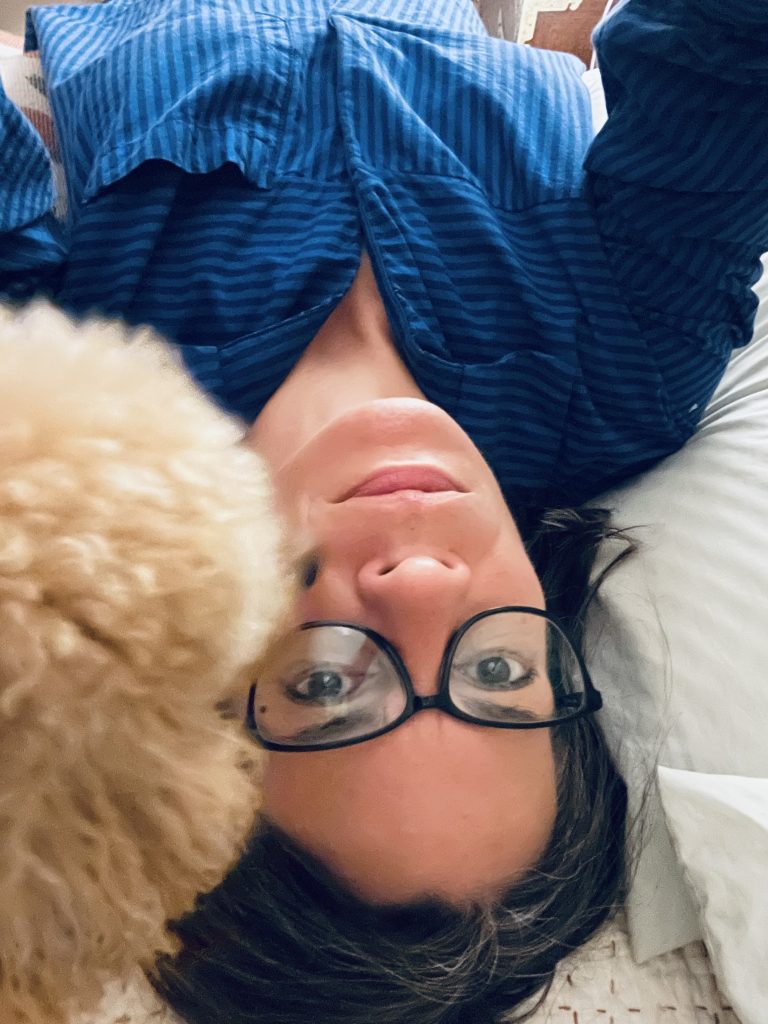The Scottish Play
by Naomi DeMarinis
The IV line that ran from a bag on a hook to the port in my chest was filled with arsenic trioxide, an inorganic compound originated from the supernova of a dying star fifty times the mass of the sun. My illness, acute promyelocytic leukemia, resulted from the mutation of two of my chromosomes which happens for no known reason to approximately two out of a million people each year. A right-sized star fused itself through the elemental table, and the remnants of its death became my medicine. The translocation of chromosome 17 and chromosome 15 nearly killed me before I knew I had cancer. The relational lattice between me and the star was made of spacetime and a near-perfect vacuum. The relational lattice between me and my disease was made of a lifetime of anticipatory dread and knocking wood against the statistically improbable. Spacetime, vacuum, and dread walked into a beige-painted chemo lounge, and that big dead star and I were in the same room.
Fifty times the mass of the sun, I slumped in my infusion chair and cried, but my doctor said I was fortunate. Another week or two without treatment—without platelets—and my brain would have bled me to death. I had a new appreciation for routine blood tests and the diseases they found when symptoms were still ignorable. I said, “I can’t believe I almost died without knowing it.”
My doctor said, “You could just as easily have been hit by a bus.” The relational lattice between me and my doctor was made of happenstance and unvarnished facts. He said my cancer could’ve been worse. Arsenic isn’t that hard to tolerate. Look.
I looked. I have never been so assaulted by my own good luck. Other patients in the chemo lounge—some his, some not—were so sick that light passed right through them, their faces fallen, turned inward, collapsed, elapsed. Stars with masses greater than fifty times that of our sun are likely to become black holes, but not always.
“Thank you for saving my life,” I said.
My doctor said, “You’re welcome.” A slight smile. A small shrug. Aw-shucksing.
Cancer began in February, and I became February, the cold the snow the ice the wind the riptide grey. Anxiety made it hard to breathe, I trembled, and my insides flopped like stranded fish. I had a fuzzy blanket, and I swaddled myself before getting into bed, but there was nothing I could do to feel warm or safe.
By May, I was exhausted, but the world around me changed its mood. Winter lingers, but Earth eventually gives itself to thaw. My dog and I walked along a river trail with a wide-open view of the entire valley. There was a storm in the sky, dark but not storming, a blend of light and darkness and mist running up into the hills, dark green in the distance, light green up close, layers of perception receding and advancing. The nearest of them glowed, and a veil of rain diffused the light, reflecting off the grass so that the grass’s green stained the air, scattering in a wavelength of 495–570 nanometers, a knowable measure I could take in. I breathed deep. Green entered my body, and my insides returned to the water.
When my doctor first told me I had leukemia, I asked, “What did I do?” I thought it was my fault, too much aspartame or artificial color.
He said, “Everyone asks that.” But acute promyelocytic leukemia is chaos and butterfly wings. It could have been gamma rays from space. One friend thinks it was microplastics. Another thinks it was a message from the universe. But it might as well have been because I changed my password on my computer to a phrase from the Scottish Play. Double double toil and trouble. An actor friend said, “Oh, that’s bad luck.” But luck, good or bad, is hard to register in the moment. I had both, but only in hindsight. After cancer, I bought Macbeth and put it on my desk as a memento mori to remind me that a bus … an unbound planet …. a rogue wave … is always bearing down and has, perhaps, already hit.
My dad and I used to stand in the yard and look through binoculars at the night sky as if through looking, the stars, like fate, would come within our grasp—the Backbone of Night, Orion, the Big Dipper—but we were looking back in time, and the stars we saw were not the stars as they really were but bright-eyed witches divining only the past.
I said, “Do you ever feel like you’ll fall in?”
And my dad said, “Yes.”
Then I said, “I feel scared when I look.”
And my dad said, “Me too.”
The cosmos is both contingency and kin, and it’s apocalypse to know that—depending upon perspective—the light we shine is a light we shined and has long since gone.

Naomi DeMarinis writes creative nonfiction and prose poetry from her home in Missoula, Montana. Her most recent publication, “Packing to Leave” appears in Pithead Chapel and was nominated for a Pushcart Prize. Currently, she’s at work on a collection of essays and poems about her experience with blood cancer and the altered perceptions of life and memory that flavor survival.
If you appreciate the work that you read at bioStories, please consider donating to help us continue to bring you voices of such quality and originality.